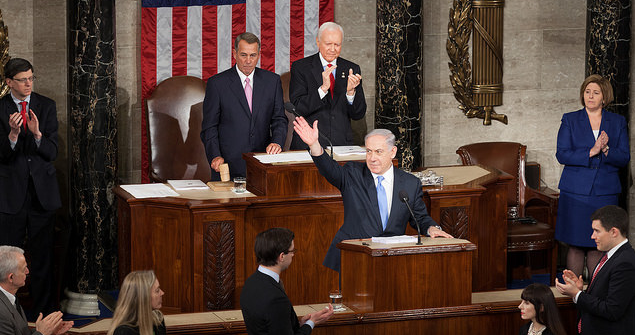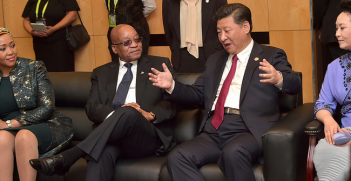Israel, Iran, and the Bomb

Israel and the US agree on stopping Iran from getting the bomb. But will leaving Tehran limited capability check or facilitate its bomb ambition? Ramesh Thakur explains why Israeli-US differences on this threaten to undermine their strategic relationship.
On March 3, Washington witnessed political theatre at its most distasteful. Israeli Prime Minister Benjamin Netanyahu came not to praise President Barack Obama but to bury a nuclear deal with Iran. The political party that prides itself on being more patriotic than its rival produced the spectacle of genuflecting to a foreign leader who used his podium in the U.S. Congress to criticize the U.S. president. Extraordinary! The rest of the world shook its head in collective disbelief.
History is littered with the corpses of those who were too clever by half for their own good. Netanyahu presumably intended his speech to harden U.S. resolve, intimidate Tehran and reap domestic rewards in elections on March 17. The net result instead will be to divide Israel from its indispensable ally and introduce partisanship where previously a seemingly unshakeable consensus underpinned the U.S. commitment to Israel. Hard-line Iranians will be delighted at and emboldened by the deepening wedge between Israel and its one consequential patron.
In the Cold War, Congress sometimes prodded the executive branch to launch diplomatic initiatives to buttress a fragile nuclear order. The Nunn–Lugar program to secure and dismantle the so-called “loose nukes” problem in the territories of the former Soviet Union was an excellent example and has been an outstanding success. Today by contrast Congress acts as a brake on the administration’s nuclear diplomacy. Consistent with this negativism, while the administration has shifted from “no enrichment” to “no bomb,” Netanyahu remains stuck at “no deal” and “no enrichment.”
Rejecting a deal as a matter of principle leaves only two alternatives. The first is to insist that Tehran capitulates completely in return for zero concession from the West. This has zero prospects of success and makes zero sense. The second is to launch military strikes to end Iran’s nuclear program. This might delay the program by up to three years but will start yet another long-term war with the Middle East’s biggest and most resourceful Muslim country and guarantee an Iranian pursuit of weaponization free from the watchful eyes of international inspectors. Other countries would begin lifting sanctions if the West walked away from an achievable deal because of Israeli rejectionism.
The critical elements of a deal that can satisfy the minimum demands and concerns of both sides include the number of centrifuges that Tehran will be allowed to operate, with 6,000 the likely upper limit although 4,000 would be preferable; the timeframe of the deal, with a decade the minimum before Iran is allowed to consider expanding capability again; and the timing of the lifting of sanctions. Because the decision requires a vote in Congress, Iran is unlikely to accept an administration promise of a deferred lifting if that has been its primary motivation in entering into serious negotiations in the first place.
Hitherto, both the U.S. and Israel have pursued a strategy of denying to any potential adversary the capacity to resist the exercise of hegemonic power. Jonathan Graubart and David Deutsch, founding members of Jewish Voice for Peace in San Diego, California, argue that both countries have repeatedly met challenges with militarism, aggressive interventionism, and disrespect for international norms and legal principles. Israel feigns victimhood but its rhetoric and actions belie belief in being weak, helpless and at the mercy of its many real enemies. It knows, speaks and behaves in the language of the power that cannot be challenged by any adversary. A nuclear Iran would be less of an existential threat to Israel – several former senior intelligence and military officials discount this – than a regional power that can no longer be attacked with impunity and defeated militarily.
Unfortunately for Israel, the global equation is changing radically for the U.S. as it grapples with renewed and persisting tensions in Eastern Europe and attempts to pivot to Asia to check China’s growing reach and influence. Cooperation with Iran by unlocking the frozen enmity that has framed bilateral relations since 1979 would help to advance shared security goals against radical extremists in Afghanistan, Iraq, Lebanon and Syria, enabling Washington to focus more sharply on troubles in Europe and Asia.
The regional nuclear equation is defined by two core propositions. First, there is no moral or strategic equivalence between Israel and Iran having 100 nuclear bombs each. Most independent analysts and people would be far more worried about Iran. Second, nonetheless, it is simply not credible that Israel can keep its bomb forever while no one else in the region is allowed to get the bomb ever (any more than nine countries can keep the bomb indefinitely while permanently blocking anyone else from getting it). Hence the key question: How can Israel manage its present military dominance and nuclear monopoly to create a regional order in which it is comfortable living once the strategic equation has normalized?
The November 2013 interim deal has effectively slowed Iran’s march to bomb-making capability and produced IAEA-verified rollbacks of fissile material stocks. A long-term deal, by locking in the extended breakout time, would mean Obama will have stopped Iran from getting the bomb and avoided another even more destructive war in the Middle East. In effect Netanyahu has been reduced to the role of crying wolf. In testimony to the U.S. Congress in 2002, ahead of the 2003 invasion of Iraq, this is what the omniscient Netanyahu had to say: “There is no question whatsoever that Saddam is seeking, is working, is advancing towards to the development of nuclear weapons… If you take out Saddam, Saddam’s regime, I guarantee you that it will have enormous positive reverberations on the region.” That worked out really well.
Israeli intransigence and unstopped headstrong expansion of illegal settlements in occupied Palestine have already lost much European goodwill and support. Now Netanyahu has shattered trust with the White House and risks opening a permanently damaging debate in U.S. domestic politics about the extent to which Washington subordinates its broader, long-term, global interests to Israel. If Netanyahu has put the most critical Israeli relationship at long-term risk for domestic electoral advantage, his actions are even more reprehensible. Someone should explain to him why the boy got eaten by the wolf.
Ramesh Thakur is Director of the Centre for Nuclear Non-Proliferation and Disarmament, Australian National University. On March 19, he will deliver a lecture on “Three Minutes to Midnight: Is the World Sleepwalking into a Nuclear Disaster?” at the Bill Graham Centre, Munk School, University of Toronto. This article was originally published on Open Canada on 6 March 2015. It is republished with permission.





